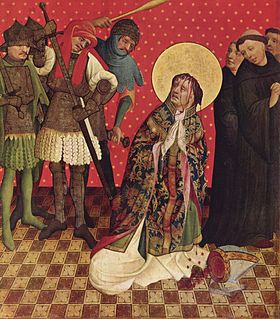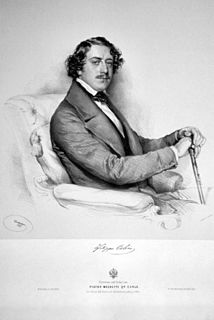
ZazàItalian pronunciation: [dzadˈdza] is an opera by Ruggero Leoncavallo, with a libretto by the composer. The story concerns the French music hall singer, Zazà, and her affair and subsequent decision to leave her lover, Milio, when she discovers that he is married. The music is influenced by the French music halls where Leoncavallo had spent his early years as a composer.

La mère coupable is an opera in three acts, op.412, by Darius Milhaud to a libretto by Madeleine Milhaud after the last play in Beaumarchais’ Figaro trilogy. It premiered at the Grand Théâtre de Genève on 13 June 1966.
Dano Raffanti is an Italian tenor, particularly associated with the Italian baroque and bel canto repertory.

Assassinio nella cattedrale is an opera in two acts and an intermezzo by the Italian composer Ildebrando Pizzetti. The libretto is an adaptation by the composer of an Italian translation of T.S. Eliot's play Murder in the Cathedral. The opera was first performed at La Scala, Milan on 1 March 1958. The opera was performed for the first time in Canada the following year at the Montreal Festivals.

Filippo Colini was an Italian operatic baritone. Debuted with the Accademia Filarmonica Romana in 1831. He is best known today for creating roles in the world premieres of several operas by Giuseppe Verdi, including Giacomo in Giovanna d'Arco (1845), Rolando in La battaglia di Legnano (1849), and Stankar in Stiffelio (1850).
Karel Hruška was a Czech tenor, radio personality, and actor of the stage and film. He was an unusual singer for his day in that he recorded and performed both classical and popular music. Possessing a great comic talent, he specialized in creating character parts on the opera stage. He was a much loved Principál komediantů in Bedřich Smetana's The Bartered Bride, notably portraying the role a total of 855 times during his career.

Chatterton is a dramma lirico or opera in three acts by Ruggero Leoncavallo. The libretto was written by the composer himself and is freely adapted from the life of the young English poet from Bristol, Thomas Chatterton (1752–1770). Although composed in 1876, it premiered 20 years later on 10 March 1896, at the Teatro Drammatico Nazionale in Rome.
Giuseppe Antonicelli was an Italian conductor who was highly active with Italy's leading opera houses from the 1920s through the 1950s. Among the houses he conducted at were, La Scala in Milan, the Teatro Regio di Torino in Naples, La Fenice in Venice, the Teatro Donizetti in Bergamo, the Teatro Nuovo in Turin, and the Teatro Lirico Giuseppe Verdi in Trieste. He also conducted a total of 158 performances at the Metropolitan Opera in New York City in 1948-1950.
Gaetano Bavagnoli (1879–1933) was an Italian conductor who was particularly known for his work within the field of opera. He was mainly active within Italy's major opera houses during the first third of the 20th century; although he did conduct at important international stages like the Metropolitan Opera in New York City and the Royal Opera House in London as well. He also worked as a voice teacher and was notably the instructor of opera singers Emanuel Kopecky, Lina Pagliughi, and Aureliano Pertile.
Caterina Galli was an Italian operatic mezzo-soprano. She first rose to fame in England in the 1740s and early 1750s where she was particularly admired for her performances in the works of George Frideric Handel. She then enjoyed success in her native country in the 1750s and 1760s, before returning to England where she remained active as a performer up through 1797.
Ezio is an opera eroica or "heroic" opera in 3 acts by Gaetano Latilla. The opera uses an Italian-language libretto by Pietro Metastasio. Metastasio's libretto was partly inspired by Jean Racine's play Britannicus and had earlier been set to music by George Frideric Handel in 1732. The work's protagonist is the fifth-century AD Roman general Flavius Aetius, returned from his victory over Attila. Latilla's version premiered at the Teatro di San Carlo in Naples on 10 July 1758. The composer both directed and conducted the production and Vincenzo Re designed the sets used in the premiere. The cast included Giovanni Carestini in the title role, Caterina Gabrielli as Fulvia, Maddalena Galli as Onoria, Caterina Galli as Valentiniano III, Gregorio Babbi as Massimo, and Antonio Ambrogi as Varo.
Carlo Ercole Bosoni (1826-1887) was an Italian composer and conductor. He was active as a conductor at La Fenice in Venice during the 1850s and 1870s. Some of his operas premiered there as well.
Gaetano Mares (1793–1862) was an Italian conductor. He notably conducted the world premieres of Giuseppe Verdi's Ernani (1844), Attila (opera) (1846), Rigoletto (1851) and La traviata (1853) at La Fenice in Venice.
Der Roland von Berlin is an opera in four acts by composer Ruggero Leoncavallo. The work uses a German-language libretto by Leoncavallo which is based on Willibald Alexis's 1840 historical novel of the same name. The opera premiered at the Berlin State Opera on 13 December 1904. Its premiere in Italy was given at the Teatro di San Carlo in Naples the following month where it was sung in Italian with the title Rolando.
I due timidi is a one-act radio opera composed in 1950 by Nino Rota with libretto by the film writer Suso Cecchi d'Amico.

Gianna Galli was an Italian operatic soprano who had an active international career from the 1950s through the 1970s. She specialized in the lyric soprano repertoire and was particularly known for her portrayals of Puccini heroines.

Zingari (Gypsies), also known as Gli Zingari, is an opera in two acts by Ruggero Leoncavallo. The libretto by Enrico Cavacchioli and Guglielmo Emanuel is based on The Gypsies, a narrative poem by Alexander Pushkin. The opera premiered on 16 September 1912 at the Hippodrome Theatre in London.
Luigi Maria Viviani was an Italian composer, conductor and violinist of Florentine origin. He was primarily noted for his ballet scores, most of them composed for the choreographers Giovanni Galzerani and Antonio Cortesi. His 1851 score for Fausto was particularly praised for its obbligato written for the bimbonclaro.
Reno Andreini was an Italian operatic tenor who had an active international career from 1902–1924. A specialist in the Italian repertoire, he was frequently heard in the bel canto operas of Bellini, Donizetti, and Rossini, and in the verismo operas of Leoncavallo, Mascagni, and Puccini. He was notably the first singer to make a complete recording of the role of Rodolfo in Puccini's La boheme in 1917. He also recorded duets from La traviata with Maria Galvany and one duet from Massenet's Manon with Riccardo Tegani with the Gramophone Company.








